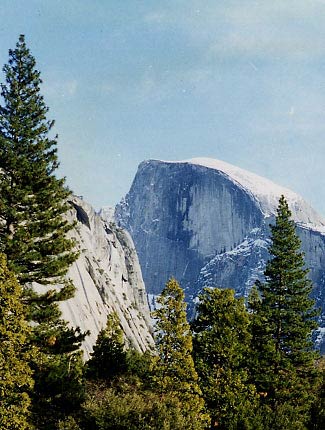

Yosemite Valley, California, by Nigel Wheatley, one of the most beautiful places on Earth and the place which inspired John Muir to write, 'We are now in the mountains and they are in us ...'.
INSPIRATION
‘The true biologist deals with life, with teeming boisterous life, and learns something from it, learns that the first rule of life is living.’
John Steinbeck in The Log from the Sea of Cortez, 1941.
‘The springs of enchantment lie within ourselves: they arise from our sense of wonder, that most precious of gifts, the birthright of every child.’
Eric Shipton, explorer and mountaineer, 1907-1977.
‘Of the gladdest moments in life, methinks is the departure upon a distant journey into unknown lands. Shaking off with one mighty effort the fetters of habit, the leaden weight of routine, the cloak of many cares and the slavery of home, man feels once more happy.’
Richard Burton, the traveller not the actor, in his journal on December 2nd 1856.
'With an anxious brow and heavy heart have I escaped from the throng of humanity, with its gloom, and anger, and sadness, with its cares, and sorrows, and anxieties - its meshes of folly and its vortices of crime, to revel in green fields, and to spend one hour at least, with nature. No bird, let loose from the gin of the fowler, ever soared into its pure blue home more joyously.'
Richard Ruegg in Summer's Evening Rambles Round Woolwich, 1847.
'I confess that, though I was a little afraid the desire that something extraordinary, something rather tragic, should happen to us, was stronger in me than that fear.'
Leo Tolstoy in The Snow Storm, 1856.
'I now belong to a higher cult of mortals, for I have seen the Albatross.'
Robert Cushman Murphy, 1912.
'The bedrock of existence is not made up of the family, or work, or what others say and think of you, but of moments like this when you are exalted by a transcendent power that is more serene than love.'
Nicolas Bouvier in L'Usage du Monde/The Way of the World, 1963/2009, while travelling across Asia in the early 1950s.
'I looked in reverie down the path through the savanna woodland and imagined walking to the Saramacca River and beyond, over the horizon, into a timeless reconnaissance through virgin forests to the land of magical names, ..., back and forth, never to run out of fresh jungle paths and glades.'
Edward O Wilson in Biophilia, 1984.
‘This is what it’s all about … To be able to go up into a valley, and not come on a pile of human dung.’
Peter Matthiessen quoting George Schaller in The Snow Leopard, 1979.
'We are now in the mountains and they are in us ...'
John Muir in My First Summer in the Sierra, 1911.
‘We were two hours and a quarter passing that swamp … I made good weather of it … only going in right over head and all twice … One and all, we got horribly infested with leeches, having a frill of them round our necks like astrakhan collars …’
Mary Kingsley in Travels in West Africa, 1897.
‘Their contented, harmonious days were replete with sunning, playing, and feeding.’
Dian Fossey on Mountain Gorillas in Gorillas in the Mist, 1983.
'A wren sang briefly, and left the silence tingling.'
J A Baker in The Peregrine, 1967.
‘The greater part of its plumage was of an intense cinnabar red, with a gloss as of spun glass … The emotions excited in the mind of a naturalist who has long desired to see the actual thing which he has hitherto known only by description … require the poetic faculty fully to express them.’
Alfred Russel Wallace writing about the King Bird-of-paradise in The Malay Archipelago, 1869.
'It may be that the gulfs will wash us down:
It may be we shall touch the Happy Isles,
And see the great Achilles, whom we knew.
Tho' much is taken, much abides; and tho'
We are not now that strength which in old days
Moved earth and heaven; that which we are, we are;
One equal temper of heroic hearts,
Made weak by time and fate, but strong in will
To strive, to seek, to find, and not to yield.'
Alfred, Lord Tennyson in Ulysses, 1842.
‘There can be no very black melancholy to him who lives in the midst of Nature and has his senses still.’
Henry David Thoreau in Walden, 1854.
‘Men come and go, cities rise and fall, whole civilizations appear and disappear – the earth remains …’
Edward Abbey in Desert Solitaire, 1968.
‘X had marked time in the limestone ledge since the Paleozoic seas covered the land. Time, to an atom locked in a rock, does not pass. The break came when a bur-oak root nosed down a crack and began prying and sucking. In the flash of a century the rock decayed, and X was pulled out and up into the world of living things. He helped build a flower, which became an acorn, which fattened a deer, which fed an Indian, all in a single year ... When the Indian took his leave of the prairie, X moldered briefly underground, only to embark on a second trip through the bloodstream of the land. This time it was a rootlet of bluestem that sucked him up and lodged him in a leaf that rode the green billows of the prairie June, sharing the common task of hoarding sunlight. To this leaf also fell an uncommon task: flicking shadows across a plover’s eggs.’
Aldo Leopold, writing about an atom in A Sand County Almanac, 1949.
If you think any quotes should be considered for posting here please Email Us.
